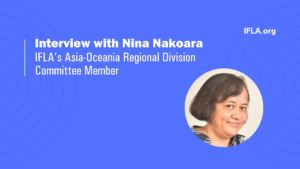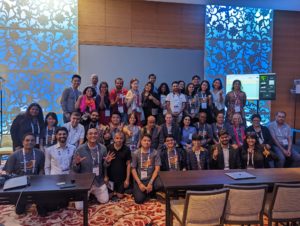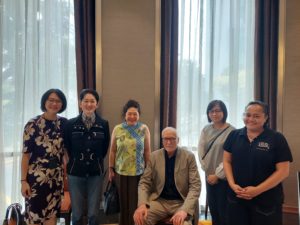A Librarian’s School of Internet Governance Experience: Interview with Nina Nakaora
30 September 2022
Internet governance covers a wide range of issues of significant library interest. We rely increasingly on the internet to achieve our mission of providing maximum meaningful access to information, while in turn being key players in ensuring that the internet itself is inclusive.

As a result, it is valuable to engage in internet governance discussions. To support this sort of involvement, there are a series of Schools of Internet Governance around the world. Librarians, alongside other stakeholders, can participate in these. In this interview, we talk with Nina Nakaora (Fiji), who participated in this year’s Asia Pacific School of Internet Governance (APSIG), ahead of the Asia-Pacific regional Internet Governance Forum (APrIGF).
IFLA: What does internet governance mean for you, and why is it relevant for libraries?
Nina: Making the Internet accessible, safe and reliable is everyone’s business. How can libraries be efficient sources of credible information and promote multiple literacies, if many public and school libraries in the region do not offer digital resources and are not able to cater for people with print disabilities?
It is of course relevant also to a wide range of potential collaborators for libraries. For me, as an APSIG-APrIGF 2022 Fellow, I had the opportunity to learn from multistakeholder experts and was able to identify potential partners.
A key highlight was sharing how our library International School Suva library supported our learning community during the Covid 19 Pandemic. We are a K-12 school with a student population of approximately 550 students. In particular, we are an International Baccalaureate (IB) continuum school and offer Year 11 and 12 students the option to study for the IB Diploma Programme or the Australian Capital Territory Senior Secondary Certificate.
Last year (2021), we checked out approximately 12,072 items and when access to our physical library space was restricted, our learners checked out print material by completing a Library Google Request form or by placing a Hold through Follett Destiny our online library catalogue. When we moved to online learning our lower primary students enjoyed some live Storytimes and curated digital library bookshelves with recorded author read aloud sessions. Our Year 2 to Year 5 students read 2,853 books (750 hours) on Epic School and our secondary learners had access to Sora (Overdrive’s student reading app).
During online instruction, it was wonderful to see our learners complete book inspired art, use keywords to search for material of interest, formulate questions to interview their peers and adults for information, learn to differentiate fake and credible sources and practice Academic Integrity by acknowledging their sources of information. They demonstrated remarkable resilience and innovation, which gives us hope for the future.

How much had you engaged with questions around internet governance before attending APSIG?
One key aspect is digital skills, and in particular, media and information literacy. Promoting this is something I do. During the Covid 19 pandemic, I saw how disinformation spread like wildfire on the internet and made people distrust medical professionals. This led me to seek assistance from a friend at the iTaukei Trust Board to translate IFLA’s How to spot fake news and How to spot fake news – Covid 19 edition into our local vernacular and worked with Lorin Pai, the secretary of the Fiji Librarians Association and our local library network to circulate the posters via email and through social media. I was fortunate to have access to good quality internet during the pandemic. When restrictions were implemented, access to the Internet enabled me to communicate with family and friends, keep up with local and global news, continue working, attend IFLA WLIC 2021, and access videos, audiobooks and ebooks. However, I never actively engaged with internet policy issues on a national and regional level because I did not understand the connection.
How was APSIG structured, and how much commitment did it take?
We had to complete a 4-week online course on Internet governance supported by the Internet Society and assigned mentors. Fellows were grouped according to economies. I was grouped with Letitia Masaea, Chair of the Pacific Islands Chapter of the Internet Society (PICISOC) and Netty Rael Hendry from Vanuatu Internet Governance Forum. Our mentors were Ms Maureen Hilyard, (Development Consultant, founding member of DC-SIDS Pacific and Chair of the ALAC of ICANN) and Gunela Astbrink (Chair, ISOC Accessibility Standing Group) both of whom are tireless advocates for an open, safe and accessible internet. There were moments when I found the online course challenging like when things got a bit technical. When fellows met face to face, the panel discussions (especially the Internet ecosystem session) and the interactive games helped to clarify some of the material we covered online. It was inspiring to see the Multistakeholder approach in action – the technical gurus, private sector and people like me, the everyday Internet user.
What sort of people did you meet there, and could any of them – or the groups they represent – be useful allies or partners for libraries?
(i) I can see the group I was assigned to working together on a project to advance digital literacy in the Pacific region. Letitia, Maureen and Gunela shared valuable information with regards to possible capacity building opportunities. They would make great partners for the Pacific Libraries Network.
(ii) I have been asked to share my APrIGF 2022 Fellow experience by the Fiji Librarians Association. This would be a wonderful opportunity to invite Anju Mangal (Chair APrIGF) and/or Swaran Ravindra (APrIGF Multistakeholder Steering Group member) to share their internet governance expertise as global leaders and the positive changes that have come about in this virtual sphere.
(iii) Vashkar Bhattacharjee (Bangladesh National Consultant in developing web accessibility with the Access to Information (A2I)). Vashkar has been working with advocates to make the Internet more accessible to people with print disabilities and after 10 years of tireless advocacy Bangladesh acceded to the Marrakesh Treaty. I heard him present and spent some time in his company. I feel that countries that have not signed the Marrakesh Treaty have a lot to learn from Vashkar and his network.
(iv) Joyce Chen (APNIC Senior Advisor for Strategic Engagement) on capacity building opportunities. She raised two important issues – emerging technologies are moving faster than people’s ethical use and how is the internet affected by climate change and its environmental impact? We live in the Pacific and are vulnerable to climate change.
(v) Jaewon Son (Institute for Technology Assessment and Systems Analysis) – I think the library sector would be interested in Jaewon’s research on Internet access and its impact on sustainability and the environment.
(vi) Ashirwad Tripathy (new vice Chair for APrIGF 2022-2024) and Binod Basnet (Educating Nepal). Both are passionate about meaningful digital education.
(vi) Clair Deevy (WhatsApp, Global Director of Social Impact) and digital app providers that can assist with digital literacy programmes.
(vii) Chandni Gupta’s presentation on Duped by design – Manipulative online design: Dark patterns in Australia was an interesting one. Actually the speakers in the session Toward Trusted Design: User Protections for a Better Web for All would be good to partner with for library Digital Literacy sessions.

What was the high point of your participation?
Sharing my story. I wanted to highlight how our school library supported our learning community during the Covid 19 Pandemic.
Were there any aspects of the School, or topics covered, that surprised you?
Digital Economy and Future of Work – I shouldn’t have been surprised about this session and yet I was. I came away thinking about the lack of Internet access in the region, especially in some of our school and public libraries. To make the APrIGF theme People at the centre: envisioning a commmunity-led Internet that is inclusive, sustainable and trusted a reality, libraries, private enterprises and governments (multistakeholder model) need to work together to empower communities to meet the challenges and opportunities of automation in the region.
How will you use what you learned in APSIG and APrIGF 2022 in Fiji?
I was particularly marked by a question asked by Mr. Rajnesh Singh (Australia – Regional Vice President, Asia-Pacific, ISOC): A lot of people should be part of the internet governance process but are not there. Why are they not there?
I would create awareness on the importance of libraries being involved in internet governance by connecting my colleagues with the contacts I made. The intention is to share information, engage and partner. Why? Because access to the Internet is a human right, and public and school libraries are in a unique position to bridge the digital divide in the region through partnerships with organisations and people who value life-long learning.
Would you recommend librarians elsewhere look to engage in Schools of Internet Governance at the national or regional levels?
Definitely! Attending APSIG was an enlightening experience.